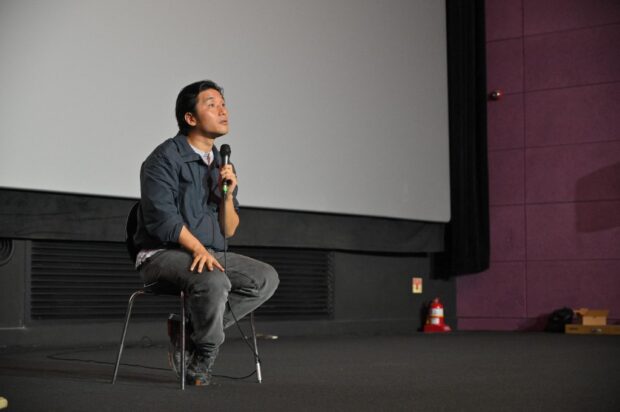‘Dear Jinri’ bares pressures K-pop singers face in the industry

In this photo taken on Oct. 7, 2023, South Korean actor Jung Yoon-suk, director of “Dear Jinri,” answers questions during a guest visit event, after a screening of the film at the Busan International Film Festival (BIFF) in Busan. A new documentary featuring a late K-pop star’s final interview unveils complex truths about the notoriously brutal K-pop industry and the cost of defying South Korean cultural norms. YELIM LEE / AFP
BUSAN, South Korea—A new documentary featuring a late K-pop star’s final interview unveils complex truths about South Korea’s notoriously brutal music industry while highlighting her defiance of pressure to conform to societal norms.
“Dear Jinri,” which premiered at the Busan International Film Festival, revolves around singing star Sulli’s last Netflix project, an unfinished film that included an in-depth interview.
Born Choi Jin-ri, Sulli took her own life in 2019 at age 25, after a long struggle with online bullying. The interview in the film—raw, powerful and heartbreaking—has never been previously seen.
What Sulli shares in that conversation raises “many critical issues in our society,” director Jung Yoon-suk said after the film’s BIFF screening Saturday evening.
“These can be seen as issues related to women, or they could be problems concerning the vulnerable in our society, or related to matters of equality,” he said.
Article continues after this advertisementSulli, who began her career as a child actress at age 11, made her debut in 2009 for f(x), which quickly became one of K-pop’s top girl groups.
Article continues after this advertisementKnown for behavior considered controversial in South Korea—including refusing to wear a bra in public—she faced relentless online bullying and was frequently targeted by sexually abusive comments.
The film also explores the singer’s lonely childhood and battles with self-perception as a woman in a world that can be intensely focused on appearance.
“Since you are born as a pretty woman, you don’t have to know anything,” Sulli says she was told.
But, she adds: “It’s obnoxious to say your life was hard because you are a pretty woman.”
The well-documented pressures of the K-pop world are also spotlighted, with Sulli explaining how she was told her goal was to be “the highest quality product.”
She likens her experience to that of the protagonist in Luc Besson’s 1990 “La Femme Nikita,” who undergoes rigorous and vicious training to become a programmed assassin, completely cut off from the outside world.
It seemed as if people “couldn’t recognize that we were human beings,” Sulli says in the film.
The interview is punctuated by frequent pauses as the camera lingers silently on its subject, the pain and sorrow palpable on her face.
Audible sobs from the audience could be heard throughout the screening.
A self-aware artist
Suicide is the leading cause of death among South Koreans aged 10 to 39 and occurs at an unusually high rate, official figures show.
Several other young K-pop stars have died of suspected suicide in recent years, including Goo Hara, Jonghyun and Moonbin. The incidents have prompted calls for increased mental health support for young people in the industry.
Sulli’s response to director Jung’s question about the online bullying she endured—specifically, her decision to grant legal forgiveness to one of the perpetrators—is arguably one of the most poignant and revealing scenes in the movie.
She also candidly discusses feminism—a topic still controversial in socially conservative South Korea—saying she “rooted for women who spoke out,” even when their views did not align with hers.
In the end, the film paints a portrait of a contemplative, resilient figure who, in the ways she could, resisted the pressure to conform, striving instead to forge her own understanding of the world and her place in it.
The film takes its title from Sulli’s legal name, Jin-ri, which means truth in Korean.
“It was incredibly important to view this person not just as a celebrity or an idol, but as someone who possesses self-awareness as an artist,” Jung said.
“It seemed like the movie would be meaningful as the truth itself, just as (her) name implies.” /ra